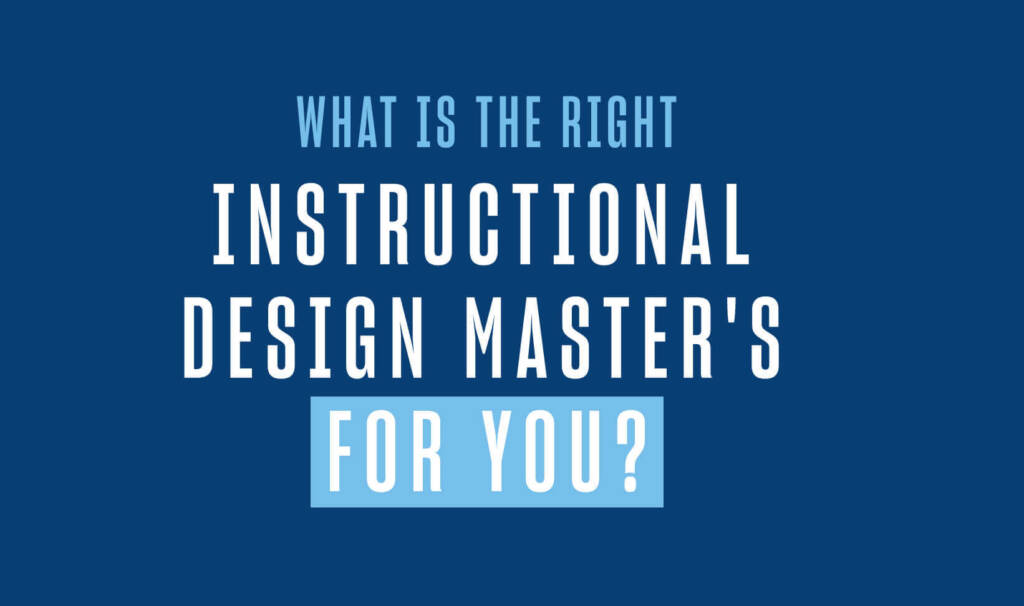If you are considering a master’s degree in the education field to launch or advance your teaching career or to position yourself for opportunities outside the classroom, you are no doubt “doing your homework.”
Specifically, this includes developing a thorough understanding of the two primary options to determine which is right for you — a Master of Education or a Master of Arts in Teaching.
In your research, you are likely to come across reports stating that an MEd is focused largely on administration and other non-teaching opportunities while an MAT is focused on teaching. While this assessment is partly true, it is an overly simplistic explanation that does not tell the whole story.
While it’s true that a Master of Arts in Teaching is typically designed for those who are already teachers or those who plan to teach in the classroom, the best Master of Education degree programs offer the flexibility to sharpen your teaching skills, position yourself for school leadership roles and also build a strong foundation from which to explore other interests in the world of education. The goal of this post is to provide a helpful overview of the MEd vs. MAT breakdown.
One of the key similarities between the two degrees is that they’re both a proven way to pursue your passion for education while also expanding your career opportunities and earning potential.
Want the Brochure for USD’s Online Master of Education Degree?
Earn your M.Ed. in just 20 months with a program designed for working professionals.
What is an MEd (Master of Education)?
A Master of Education degree is designed for current educators who wish to expand their understanding of teaching theories, pedagogy, strategies and more. Though the degree is well-suited to teachers seeking new ways to make an even greater impact in the lives of their students, those who choose the MEd pathway often hold aspirations of expanding their career beyond the classroom.
For example, if you are interested in becoming a school principal, designing curriculum working in a college or university setting, or positioning yourself for business roles such as a corporate trainer, an MEd will equip you with the skills required to be successful.
In addition, MEd programs typically offer students the choice of specializing in specific areas such as:
- Curriculum & Instruction
- School Leadership
- Inclusive Learning & Special Education
- Literacy & Digital Learning
- STEAM (Science, Technology, Engineering, Arts and Mathematics)
- Technology and Innovation
Traditionally, MEd programs take about two years to complete; and now more schools offer flexible online formats that enable you to work a full-time teaching job while working toward your Master of Education degree. Most MEd degrees will prepare you for initial licensure in your state.
What is an MAT (Master of Arts in Teaching)
A Master of Arts in Teaching is designed to give current and prospective teachers the hands-on, practical skills they need to be effective in the classroom.
If you are currently teaching and wish to gain additional subject-specific skills and strategies, an MAT offers many opportunities to focus on:
- Childhood Education
- Elementary Education
- Secondary Education
- Special Education
- Gifted & Talented Education
- And more
Similarly, if you are looking to change careers and move into the teaching field, the MAT will offer you the education you need to do so and prepare you for initial licensure in your state. Another reason the MAT degree is an excellent option for career changers is that there is typically a required student teaching component, which will enable you to practice and experience an actual classroom.
Much like the MEd degree, MAT degree programs typically take about two years to complete and are offered in varying formats at many schools across the country.
[RELATED] 10 Traits of Successful School Leaders >>
| MEd | Both | MAT |
| 36 credits/units (average) | 2 years to complete | 42 credits/units (average) |
| Current educators looking to advance their careers | Can incorporate field experience | Aspiring or new teachers |
| Provides comprehensive understanding of the practice of education | Can increase earning potential | Focuses on practical skills and subject-specific information |
| Prior teaching experience required | No prior teaching experience required |
MEd vs MAT [Career Opportunities and Salaries]
Teachers choose to become teachers because they love to teach, not to become millionaires. However, earning a master’s degree not only helps you expand your spectrum of career opportunities, it can also significantly increase your earning potential.
Though estimates vary greatly, a U.S. Bureau of Labor Statistics report examining graduate degree “wage premiums” for those who hold a master’s over a bachelor’s degree indicates significant differentials in the education field.
According to the most recent BLS data, “Education administrators had the highest percentage wage premium, with 44 percent higher wages for master’s degree holders than for bachelor’s degree holders. The wage premium for preschool and kindergarten teachers was nearly as high, at 43 percent.” The differential for elementary and secondary school teachers ranged from 24 to 28 percent.
Are You An Educator Considering the M.Ed Path?
Read the top 11 reasons to earn your master of education degree.
The following is national median salary data for jobs commonly held to education professionals possessing a Master of Education or a Master of Arts in Teaching:
MEd job titles and salaries:
- School Principal – $94,390
- Post-Secondary Education Administrator – $92,360
- Training and Development Manager (Corporate Trainer) – $108,250
- Curriculum Developer – $62,270
- Media Specialist – $46,849
- Special Education Teacher — $59,780
- Instructional Coordinator – $64,450
- School Counselor – $55,410
MAT job titles and salaries:
- Elementary School Teacher – $58,230
- Middle School Teacher – $58,600
- High School Teacher – $60,320
- Adult Literacy & HS Equivalency Diploma Teacher – $53,630
- Special Education Teacher — $59,780
Master of Education vs. Master of Arts in Teaching [Comparison Table]
| MEd | MAT | |
| Average Units/Credits | 36 | 42 |
| Time to Complete | 2 years | 2 years |
| Ideal For | Current, licensed educators looking to move into leadership roles or improve their own instructional strategies | Those looking to launch or advance a teaching career |
| Program Focus | Comprehensive understanding of the practice of education | Practical skills and subject-specific information |
| Teaching Experience? | Yes | No |
| Sample Coursework | Educational Leadership, Curriculum Design, Educational Research Methodology, Cognition & Learning | History and Philosophy of Education, Learner Differences, Technology & Instruction, Foundations in Literacy |
| Common Careers | Principal Curriculum Developer Instructional Coordinator Reading Specialist | High School Teacher Special Education Teacher Middle School Teacher Elementary School Teacher |
MEd Degree vs MAT Degree: Programs
An MEd degree allows you to work in education without limiting yourself to the teaching profession. Programs offering MEd degrees enable students to pursue instructional design, student advisement, administration or leadership.
There are many MAT programs available that span the entire K–12 spectrum. Plenty of MAT degree programs also offer the option to specialize in teaching a certain grade level or age group (see the next section). While this is beneficial for those who have a specific career trajectory in mind, it can limit the opportunity to expand or sharpen your skill set and become a more sought-after candidate in the field.
MEd Degree vs MAT Degree: Concentration Areas
Educators earning their MEd can expand their teaching expertise with concentrations in:
Teaching STEAM: A hot topic in education, teaching STEAM (science, technology, engineering, arts and mathematics) in K–12 classrooms is a highly valued skill set among educators.
Curriculum and Instruction: This concentration provides beginning and current teachers a comprehensive understanding of educational theory, which includes curriculum development, teacher leadership and human development.
Literacy and Digital Learning: Digital learning tools and education go hand in hand, and the ability to incorporate these tools into your classroom is essential. This concentration pairs digital literacy with improving student performance in core subjects.
Counselor Education: Aspiring guidance counselors or school mental health counselors typically choose (or are required to complete) this concentration.
Educational Administration: If you’re interested in becoming a principal or other high-level school administrator, this concentration is for you. You’ll study faculty leadership, educational law and community issues. Some aspiring school administrators also seek to earn their doctorate in education, which opens up further career opportunities.
MAT degrees are available with (though they are certainly not limited to) the following specializations:
Early Childhood Education: These programs concentrate on instructing students ages 4 and younger, though some extend to include kindergarten and first grade.
Primary/Elementary Education: This MAT concentration is designed for teachers who want to specialize in K–6 instruction. Teaching methods and learning styles form the basis of coursework, and electives allow educators to round out their expertise.
Secondary Education: This specialization equips teachers to lead grades 7–12. Foundational topics are covered, with additional concentration in mental health and inclusivity excellence.
Special Education: Teaching students with special needs or disabilities requires this MAT concentration. Coursework includes learning about a range of intellectual, physical and cognitive disabilities, as well as how to instruct these students in a way that acknowledges and respects their abilities and needs.
Gifted and Talented Education (GATE): Though a bit difficult to define, this speciality (also called Talented and Gifted, or TAG) involves teaching children identified as having above-average intellect or aptitude in certain skill areas. TAG educators can teach at academies or so-called “magnet” schools in specific subjects like performing arts, mathematics or speech and debate. GATE also encompasses teaching students who are considered twice-exceptional, or identified as having above-average intellect and one or more disabilities.
Want the Brochure for USD’s Online Master of Education Degree?
Earn your M.Ed. in just 20 months with a program designed for working professionals.
MEd Degree vs MAT Degree: Coursework
Since an MEd degree outcome expands beyond classroom instruction, courses will cover broader topics such as school administration, education law, school counseling or academic advising.
The primary goal of a MAT degree is to help graduate students become teachers. Besides an introduction to teaching foundational subject matter, MAT program courses cover psychological and social theories, instructional strategies for students with different learning styles and abilities, and teaching within state curriculum standards.
MEd Degree vs MAT Degree: Time Commitment
In general, master’s degrees can be completed in two years with a full-time schedule. Part-time course loads will extend this timeline, as will certain specializations.
MAT degree programs generally require full-time commitment, but there are MEd programs that can be completed on a part-time or flexible schedule, including the online Master of Education degree at University of San Diego. This program offers two courses per semester, each with a 7-week duration, able to be completed in two academic years.
MEd Degree vs MAT Degree: Field Experience
Some MEd programs offer a practical component, though not necessarily one in a classroom. Depending on your specialization or program, you may be placed into an assistantship in a school guidance office, counseling center, administrative headquarters or with experienced curriculum designers.
Nearly every MAT degree program includes a student teaching component, offered concurrently with coursework. This is the best way to gain classroom experience before taking on the full responsibility of becoming a licensed teacher. Putting what you’ve learned into action (and getting to observe more seasoned teachers at work) is an invaluable “field experience” that can’t always be taught in a classroom setting.
Earning Your Education Master’s Degree Online
Thanks to advancements in online learning, your ability to earn your education master’s degree online while continuing to work in your current job is greater than ever before. Many top MEd programs also offer a variety of specializations that enable you to focus on your areas of interest.
For example, the highly regarded online Master of Education program offered by the University of San Diego, designed for educators with two or more years of teaching experience, is valuable whether you wish to transform your classroom or transition into school leadership while also positioning yourself to explore other opportunities in the world of education.
[RELATED] Download our free eBook to learn the top reasons to earn your Master of Education degree >>





